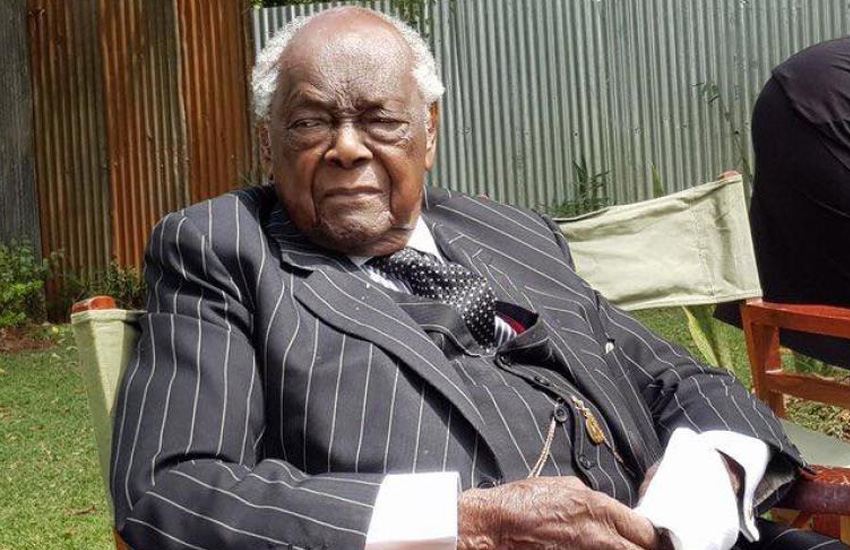Former long-serving Attorney-General Charles Njonjo, refuting the recent online reports of his death, chose to echo with a light touch, the words of one of the finest American writers, Mark Twain.
He wrote in a press statement issued on October 10: “Reports of my death have been greatly exaggerated. I am well and enjoying my weekend at home as we celebrate Utamaduni Day.”
News websites that had published the fake report quickly apologised to the centenarian after his family dispelled the rumour. However, the anglophile Kenyan took it in his stride, appearing to enjoy his sudden return to the limelight, as he became the subject of discussion at home and beyond.
Retired communications expert Salim Lone, a good friend of Njonjo, would profusely apologise to his family and the public for sharing the fake news on social media.
“I feel truly awful. I posted comments about my dear friend, Mr Charles Njonjo, and his passing. It seems I was totally wrong. I should have checked. I feel very ashamed and offer sincerest apologies to all who were misled by my post,” he said in a press statement.
Former Nairobi Governor Mike Sonko also apologised to the Njonjo family, saying he had got the news from Lone.
Even in his extremely advanced age of 102, Njonjo is known for his sharp dressing. He is the man who was always synonymous with dark, specially tailored pinstriped three-piece suits, complete with a rose in his lapel. On scrutiny, his initials, CN, would pop up on the suits made overseas by some of the most accomplished tailors.
His appearance would be incomplete, without matching neckties and a chain. For nearly 20 years, Njonjo was the AG from independence in 1963 to 1980, as an influential member of the administrations of founding President Mzee Jomo Kenyatta and his successor, Daniel arap Moi.
As the chief legal adviser to the government, Njonjo is remembered for his warning on October 10, 1976, to politicians who were calling for constitutional change to manage the presidential succession.
He laid down the law in his own way, stating that it was a criminal offence punishable by death for anyone “to imagine, devise or intend the death or deposition of the President”.
He added that the utterance or declaration of such “imaginations, devices, or intentions” would be punishable by a mandatory life imprisonment.
With that fiat, Njonjo stunned the “Change the Constitution” group and paved the way for Moi to succeed Mzee Kenyatta, on his death in 1978. The politicians had for about a fortnight been organising rallies in Nakuru and other districts, calling for a change of the Constitution to block Moi from automatically succeeding Mzee Kenyatta.
But the kingmaker would himself later fall prey to similar machinations, when he was accused of being a traitor.
He had left the AG’s office to become the MP for Kikuyu and served briefly as the Minister for Constitutional Affairs. He seemed destined for greater heights before being cut down by Moi’s allies, who accused him of scheming to depose the President.
The President then appointed a commission of inquiry into Njonjo’s alleged scheme. He would later be found guilty, pardoned, and ejected from the government. That ended his meteoric rise since independence. He has since then lived a quiet life in retirement.
Last year, he was in the news when he toured Uganda’s famed gorilla attraction in the west of the country. In his frail state, it was a laboured trip, but it was an occasion he seemed to thoroughly enjoy.
Njonjo’s pedigree is well-known. He was educated in some of the best institutions in East Africa and overseas. He went to Alliance High School at Kikuyu and King’s College Budo, near Kampala, in Uganda, where among his classmates was the future Kabaka (King) of Buganda, Sir Edward Mutesa, who became the first President of Uganda.
The son of a colonial chief, Josiah Njonjo, of Kabete, Kikuyu, in central Kenya, then journeyed south, joining Fort Hare University before going to the United Kingdom to study law.
He was so British in his mannerisms that he earned the unofficial title, Sir Charles, the Duke of Kabeteshire, of course, mimicking the British aristocracy.
After enjoying his bachelorhood until he turned 52, Njonjo married an Englishwoman, Margaret Bryson, and they have three children. His eldest child, Wairimu, followed in her father’s footsteps, becoming a lawyer like him.
Njonjo, one of the two surviving members of the first post-independence Cabinet, — the other is James Osogo — had the best in life and continues at a much-slowed down pace. He has seen it all, building an enviable personal legacy.
khagunda@gmail.com




